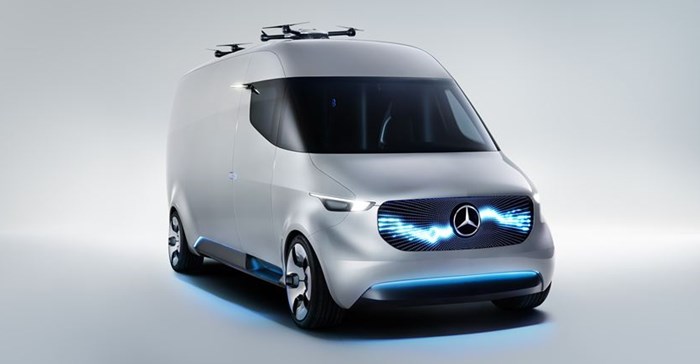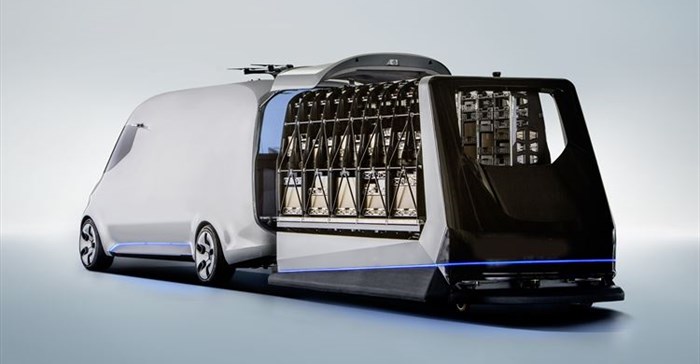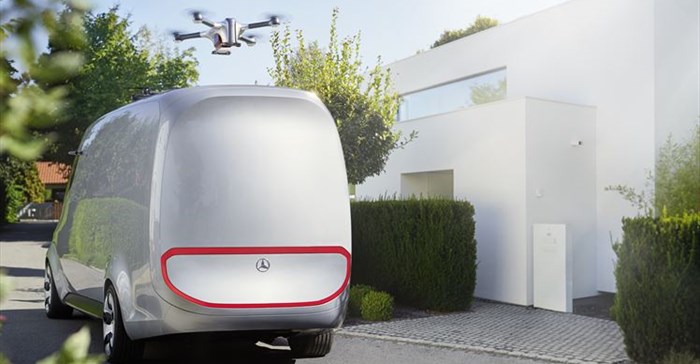
Mercedes-Benz reveals drone-equipped delivery van concept
Mercedes-Benz Vans has unveiled its strategic future initiative adVANce for the transport industry, which the company says caters to customers' evolving requirements. The transformation of the industry is the result of various economic and social trends, among them urbanisation, the growth in e-commerce, the intelligent networking of a wide range of technologies in the Internet of Things (IoT), and the proliferation of platform-based business models.

The company is making use of present-day and future technological opportunities presented by digitalisation, automation and robotics. The business division is developing from a vehicle manufacturer into a provider of system solutions and will offer integrated and intelligent systems in addition to its basic vehicles in the future.
All electric, connected van
Customer requirements are changing at a rapid pace. Examples include the burgeoning business in food and everyday necessities ordered online. Here, demand for same-day delivery or delivery within an hour is increasing. At the same time, more and more people are living in cities - by 2030 urban areas will be home to more than two thirds of the world's population. The rising transportation requirements will need to be met faster and more efficiently in future and in an environmentally friendly way.
Mercedes-Benz Vans has thus revealed the 'Vision Van' van study, presented in Stuttgart and evolved as part of the adVANce initiative. This all-electric vehicle combines various innovations for last-mile delivery in urban and suburban environments. It is the first van worldwide to fully digitally connect all people and processes involved, from the distribution centre to the consignee. It is also the first van to feature a fully automated cargo space and integrated delivery drones. For example, if a parcel service provider stops his vehicle in a residential area, it will be possible to deliver multiple packages to nearby consignees autonomously by air - even if they are not at home - in addition to manual delivery.
This makes the deliverer's job easier, reduces the delivery time and offers end customers new opportunities such as same-day delivery at an agreed time. Mercedes-Benz Vans envisages deployment of the Vision Van boosting efficiency by up to 50% on the last mile. The vehicle is equipped with a 75 kW electric drive and - depending on the intended application - has a range of 80 km to approximately 270 km. Deliveries are emission-free and the van moves almost silently, meaning that it can be operated in cities even during times when there are traffic restrictions or for late-night deliveries in residential areas.

Three key fields of innovation
As part of the strategic future initiative, Mercedes-Benz Vans will be focusing on three fields of innovation: the first involves incorporating the van into the Internet of Things. For this purpose, smart technologies are integrated into the van, increasing its efficiency and making it a central component of the digital value chain. The focus here is on relevant applications and connectivity solutions.
One example is developing a telematics unit for vans which collects and processes data concerning the status of the delivery tour, the present location and the load, and sends this information to the distribution manager. In this way it is possible to monitor and manage last-minute changes within the fleet efficiently from a central point.
Another application concentrates on the efficient part and tool management for service vehicles, for example tradespersons' mobile workshops. In future new holistic system solutions will enable parts to be ordered in a fully automated way by means of an intelligent inventory management within the vehicle, as well as for the relevant parts to be placed overnight directly into the van. Intermediate steps such as inventory evaluation, ordering parts manually and the tradesperson having to equip the vehicle are no longer necessary.
The second focal point is on innovative hardware-based solutions for the transportation industry. Here Mercedes-Benz Vans is working on automated cargo space systems for delivery vehicles for parcel services, for example. Until now, deliverers need to rearrange their packages (on average around 180 per load) ten times while making deliveries within a residential area and schedule approximately three to four minutes per stop.
New, interconnected cargo space systems make loading and unloading much faster, thereby increasing process efficiency. One-shot loading (loading the vehicle with all pre-picked parcels in one go) cuts loading times considerably and reduces the amount of vehicle downtime at distribution centres. When the deliverer is unloading, the system will show him the exact load configuration and make the right package available at the right time for delivery depending on the delivery destination. The team at Mercedes-Benz Vans also has the integration of autonomous delivery systems such as drones or self-driving robots in mind.
The third field of interest is new mobility concepts for the on-demand transportation of goods and people. In future these intelligent mobility concepts could supplement public transit by making fast, efficient and individual transport of passengers possible during peak and off-peak hours via ridesharing concepts. In the future, the intelligent networking of technologies can also make the transportation of goods more efficient and considerably improve transport on the last mile. The company is also working on leasing, rental and sharing models, which are tailored to the needs of van customers.

New organisational unit within start-up sector
In order to fully exploit the numerous opportunities of evolving the van and vehicle-related business systems, Mercedes-Benz Vans has created a new organisational unit called Future Transportation Systems. The project teams are based within the start-up scene in Stuttgart, Berlin and Silicon Valley. They work closely with customers and partners from business, technology, logistics, research and the public sector.
The objective of working with young companies, the company says, is to combine the knowledge of the vehicle sector accumulated over decades with new perspectives, agile working methods and innovative ideas.






